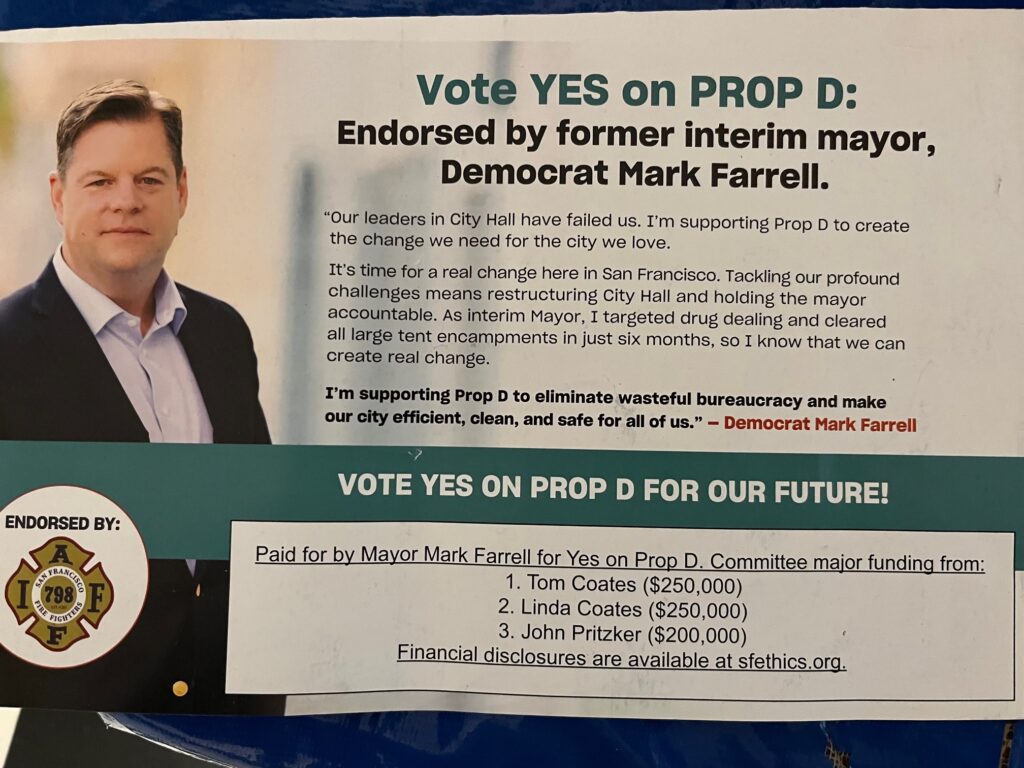While stories like the recent one in the SF Standard by Han Li have provided a fine overview of Propositions D and E, what’s desperately missing has been context—why is TogetherSF spending close to $10 million to pass a bureaucratic reform measure? Here’s a hint: It’s not about bureaucracy.
Last summer the US Supreme Court, on a strictly partisan vote, gave virtually unlimited power to the American president. Backers of Proposition D are now trying to do a similar thing here in San Francisco by trying to take away the tools we use to check executive power.

According to TogetherSF’s internal documents, leaked by The Phoenix Project in September, TogetherSF is working on a six-year plan to take over San Francisco’s government, top-to-bottom. The plan is two-fold: get their candidates elected to open seats, and pass ballot measures that will fundamentally reshape the power structure of San Francisco’s government. Prop D falls into the second part, along with a further charter amendment that would move district-based elections back to city-wide. In combination, these amendments will effectively consolidate San Francisco’s power at the top.
Democracy, whether in a country like the US or a city like San Francisco, rests upon a handful of core principles. One of those principles is accountability. A government, or a chief executive, that cannot be held accountable to its citizens can never be fully democratic. For decades San Francisco has kept its government and its mayor accountable through both the Board of Supervisors and healthy commissions that exercise a kind of soft oversight over executive agencies.
Proposition D is being presented by its deep-pocketed donors as being about cutting bureaucracy and red tape, but that is misleading. Proposition D is about reducing accountability, and therefore democracy, in our city.
San Francisco is facing of a very competitive race for mayor. Among the leading candidates is a conservative financier who enjoys the backing of TogetherSF and whose detractors have been calling him MAGA Mark. Another candidate has been a leader of progressive San Francisco for a generation. Whether Mark Farrell, Aaron Peskin or the other leading candidates such as incumbent Mayor London Breed or billionaire Daniel Lurie win this divisive race, supporters of the other candidates know that the mayor will be held accountable and have his or her power limited by commissions and the Board of Supervisors. That knowledge means that all factions will continue to have a voice in city government. Another word for that is democracy.
Shared power can sometimes take time and be messy, but it’s better than a streamlined system that gives too much power to the mayor, particularly at a moment when unprecedented amounts of money are flooding out politics here.
Those tens of millions of dollars are not just disconcerting for so-called “progressives,” but all San Francisco residents that believe that their government should be open and accountable to community interests. San Francisco has had a nearly 150-year tug-of-war between downtown corporate interests and organized neighborhood residents. These fights defined both the 1932 City Charter, which radically consolidated power in the hands of the elites, and the 1976 Charter Amendments, which brought district elections for supervisors and shifted some power back to the neighborhoods.
TogetherSF, as a political pressure group, is more than just a new player in this fight. Guided by their corporate billionaire backers, such as co-founder, board member, and biggest funder Michael Moritz, TogetherSF and similar organizations like Neighbors for a Better San Francisco and GrowSF, are bringing more money to the side of downtown, corporate and real estate interests than ever before. They also understand that as long as San Francisco’s democracy remains strong they have little chance of winning, so they are trying to change the rules of the game.
I hope and believe San Franciscans will see through this new iteration of the corporate power grab.
Jeremy Mack is executive director of The Phoenix Project.





